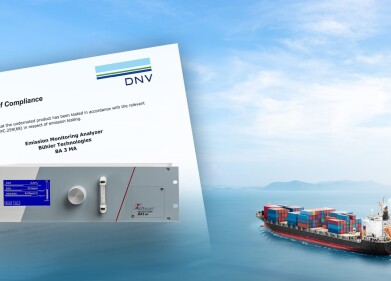Measurement and testing
Will New Lubricants Be Needed for Sustainable Marine Fuels?
Dec 08 2022
In 2022, we’re undeniably entering a new era in the maritime industry. With new types of engines being installed, the list continues to lengthen of transitional and sustainable fuels that the industry will use to decarbonise - but these changes necessarily pose challenges for marine lubricants.
With current agreements in place, emissions from the shipping industry – which, all in all, account for 3% of global CO2 emissions – must be slashed by more than 40% for 2030 and by 70% for 2050. A variety of replacement fuels are being explored – in recent months, for instance, hydrogen has received a lot of interest, with partnerships and commitments being signed at COP 27. But for the short- to medium-term, all eyes are on interim or transitional fuels, like liquid natural gas. There’s a problem with these, however.
In 2020, the International Maritime Organisation introduced a 0.5% sulphur-content cap for marine fuels, intending to generalise the use of fuels with low sulphur content. These new regulations, however, had the added effect of prompting a change in base-number grades for marine lubricants, with many firms switching from BN70 or BN100 cylinder oils, to BN40s. Newer BN40 products aim for compliance with MAN Energy Solutions’ new Category II performance standards for lube oils. The new category came about because some lubricants aimed for low sulfur applications were not adequately able to prevent and manage deposit formation.
Importantly, liquid natural gas has an exceedingly low sulphur content and conventional cylinder oils designed for such sulphur concentrations can’t handle with the temperatures, leaving damaging deposits which result in increased wear. But the innovations in BN40 lubricants, prompted by regulatory changes, has (perhaps, deliberately) provided this transitional fuel with the beginnings of a solution to these problems.
With biofuels, the problems are almost identical – or, at least, that’s what researchers predict. Taking the car industry as a case study, a switch from all diesel fuel to all biofuel has led to increased deposits and wear. There have been no large-scale, long-term studies of biofuel in the marine sector, all of the available research has been short-term and current usage in the industry is fairly meagre. It’s currently unclear just what the role of biofuels will be in the maritime sector’s future, although some predict that it’ll be taken up as a pilot fuel. In any case, new lubricants will need to be developed to deal with deposits.
And then there’s ammonia. For many years, advances have been accruing, as engines that utilise ammonia are gradually developed – indeed, the world’s first ammonia-powered turbomachinery is scheduled for release in the next few years. But ammonia’s quite a unique source of energy with its own unique characteristics and as it stands, there have been very few chances to see how it really behaves in the environments in which it will eventually be deployed. There are concerns over corrosion and neutralisation, both of which lubricants will be drafted in to solve.
In all cases, then, the future is uncertain for marine lubricants, and uncertain for the sector as a whole. What is certain, however, is that innovation, and lots of it, will be needed.
Digital Edition
PIN 26.1 Feb/Mar 2025
March 2025
Analytical Instrumentation - Elemental Analysis for Quality and Process Control at Refineries, for Lubricants and Wear Metals in Engine Oils - Synthetic Lubricants: New Developments - Scaling...
View all digital editions
Events
Apr 14 2025 Moscow, Russia
Apr 15 2025 Moscow, Russia
Apr 22 2025 Hammamet, Tunisia
Apr 22 2025 Kintex, South Korea
Solar & Energy Storage Summit 2025
Apr 23 2025 Denver, CO, USA



















